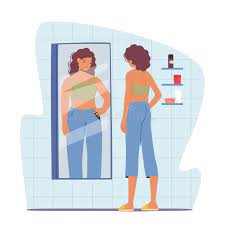
Negative views on body images can lead to a number of mental health problems, such as eating disorders, body dysmorphia, depression and anxiety. It can even lead to isolation and extremely low self-esteem. Positive body image, on the other hand, has been linked with better mental health, higher-self esteem and healthier relationships.
In order to be perceived as beautiful, individuals need to have these unattainable standards, characterized by an hourglass figure, a skinny waist, big lips, sharp facial features, a button nose, a thigh gap and a flat stomach.
Beauty is by far the biggest insecurity women report (according to the poosh.)
Research has shown an overwhelming amount of evidence that is racist and gendered beauty standards have a devastating impact on both the economy and wellbeing of individuals.
Beauty standards can cause a false sense of identity and put unrealistic expectations on anyone, which unfortunately, dissuades people, teens especially, from being true to themselves.
Girls aged 13-19, said their body image causes them to often or always worry. While body image concerns affect both boys and girls, research suggests that girls are more likely to be dissatisfied with their appearance and their weight than boys according to Mental health org.
As children grow older, their peers begin to play more of a role in reinforcing what an ideal body looks like. This can be through pressure from friends to feel accepted. Around 42% of young teen girls agreed that things their friends said caused them to worry about their body image according to the Mental Health Foundation.
Insecurities like body image and appearance issues can start from being bullied in school or constantly scrolling through social media and comparing yourself to others.
Research published in 2023 found that teens and young adults who reduced their social media usage by 50% for just a few weeks saw significant improvement in how they felt about their weight and their overall appearance compared with peers who maintained consistent levels of social media according to the American Psychological Association.
At age 13, 53% of American Girls are unhappy with their bodies. This number grows to 78% by the time girls are 17 simply because of other people’s comments on their bodies.
Young teen girls who are feeling down are more likely to focus on the negative messages around them and make negative comparisons of their bodies and what they see as ideal bodies.
Feeling self-conscious or uncomfortable with appearance, body size or shape can lead to women and girls reducing or avoiding physical activity engagements. This could be associated with the feeling that being active or engaging in particular activities exposes their body to the public eye.
We as a society need to work on accepting how bodies look and not bringing down others based off of their appearances. Also think before you make a comment on someone’s appearances. Everyone is equally as beautiful and deserves the same amount of respect.

